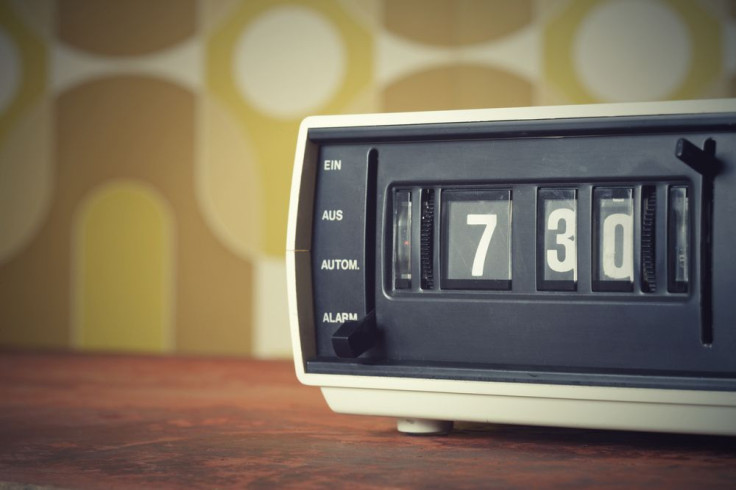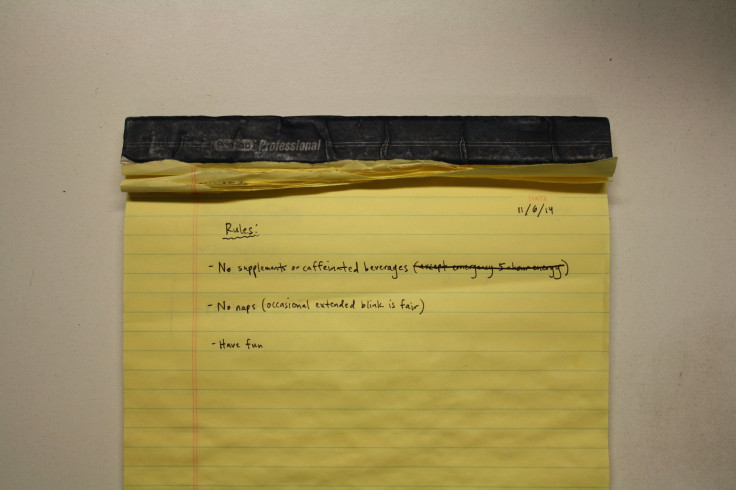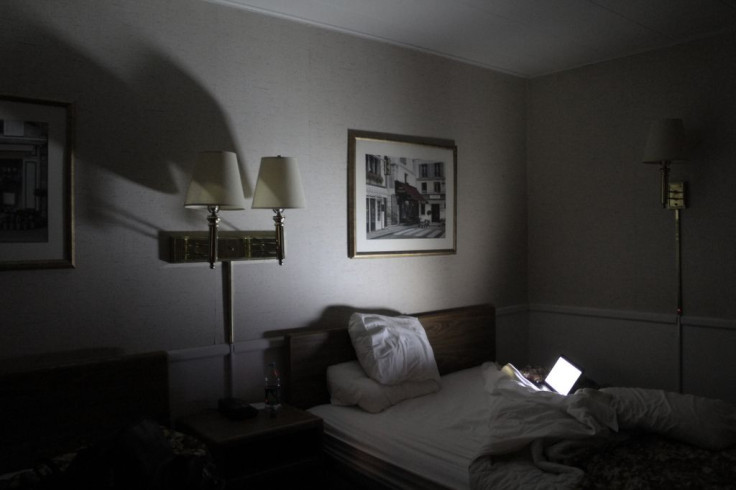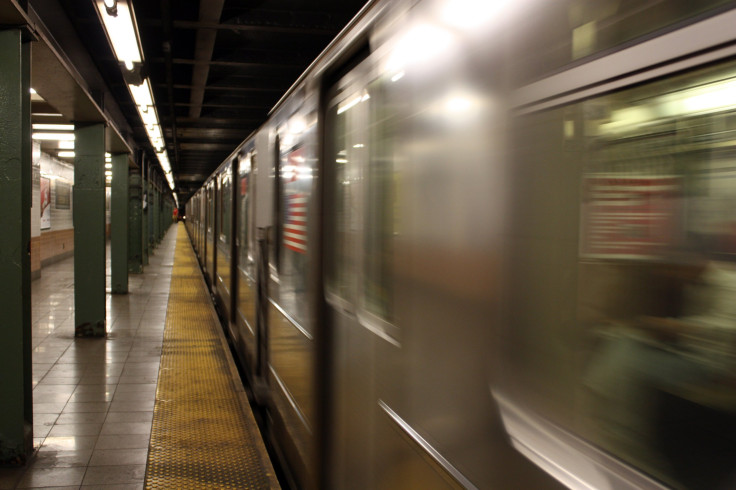Too Few Apples: One Man’s Unaided Journey To Stay Up 48 Hours Straight

It was shortly after lunch on a Tuesday when I signed my life away. I hadn’t intended to do it. Things just sort of went there. It was Sept. 30, and I was a couple weeks away from conducting one of the writer experiments that we, as an editorial team, collectively decided were somehow not terrible, dangerous ideas. My task was to go one week without a cell phone. I felt uninspired.
Like one of those idiots you hear about, I emailed my bosses with the idea that someone should go two or three days without sleeping. I don’t know what I expected them to say.
“Really like that one,” Nadia, one of my editors, replied. “Volunteering, Chris?”
Prologue
Maybe it was my subconscious desire to take on the challenge that drove me to suggest it. I write mostly about brain health, and every study I’ve come across has affirmed and reaffirmed the same basic facts about sleep deprivation. It kills brain cells. It kills your memory. It kills your immune system. Stay up for long enough, it can just plain kill you.
So like a gluttonous moron, I bit. I dropped the no-cellphone story like a toxic lover and sent back my boisterous, if headstrong, reply. “Take my name off the no cell phone list,” I said. “Sign me up. Things are gonna get weird.”
There were some things I need to come to terms with. For one, I decided staying up for 72 hours was just reckless. Forty-eight hours was sufficient — doable, if challenging. I had never stayed up for more than 24 hours, and I only did it once, in college, with lots of fizzy caffeinated drinks by my side. Even in my normal dealings, I don’t drink coffee. I don’t drink soda. I don’t take any of the prescribed stimulants people get from some dude named Josh because he has ADHD. I don’t do much of anything to stay awake except eat well and sleep.
This made for a quick and dirty set of rules I had to follow on my no-sleep journey, which I scheduled to begin Thursday, Nov. 6 at 7 a.m., when I wake up for work, and conclude precisely 48 hours later, and not a minute more, on Saturday, Nov. 8 at 7 a.m. I also took a series of memory tests and completed two different types of puzzles, a crossword and Ken-Ken, to gauge how much my brain hated me. A baseline blood pressure reading put me just shy of the optimal 120/80, at 117/76.

I considered the first two rules a given. The real challenge was the third one.
Act I - The Calm Before the Storm (0-12 hours)
After a slew of haunting, intermittent reminders from my friends and coworkers in the weeks leading to the challenge and an onslaught the final days before, I awoke that Thursday at 7 a.m., as prescribed, with one thought: “This was a bad idea.”
The first 12 hours weren’t as taxing as they were anxiety-stricken. I spent probably too much time researching tips to stay awake. Cold showers were a popular choice. Eating high-sugar fruits like apples showed up a lot. These recommendations were hard to take seriously. To my brain and body, it was still a normal day. But even if I felt good about my chances, I knew I had no idea what sleep deprivation would feel like. I likened it to the impossible task of imagining hunger after finishing a feast.
3:21 p.m. I google “Olive Garden slogo.” It has begun.
6:24 p.m. I get home from work. It’s cold in my apartment, so I reflexively leap across my bed to fire up the radiator. Then a thought hits me, reminding me warmth and comfort are my mortal enemies. I quickly remove my shoes and socks, leaving my bare feet exposed on the hardwood. I opt not to change out of my work clothes, a button-down and jeans. I pat myself on the back for outsmarting my biological impulses.
6:54 p.m. I realize I’m looking forward to sleep. My dumb brain, like an anxious puppy, still thinks it’s getting a treat tonight but will instead be getting treated to having its face rubbed in the carpet. These are trumped-up charges and I know it.
Act II - You’re Gonna Die, Clown (12-24 hours)
10:02 p.m. My eyelids start to feel heavy. Ever since I started waking up at 7 a.m. over the last year, regrettably I’ve become sort of a lightweight. That was part of the motivation behind this challenge. I was fed up with surrendering to my circadian rhythms each night, yawning on cue, yet still punishing my brain’s best efforts to release melatonin, the hormone that makes you groggy, by shining the light of an iPhone in my face.
I’m in decent shape, but I feel like an old man when it comes to sleep. Charlie Rose is on TV. I can’t remember when I started watching.
10:09 p.m. I turn Charlie Rose off. I turn Happy Gilmore on.
10:19 p.m. I rub my eyes for the first time and realize this will be miserable. Four hours after getting home from work and I’m still wearing the same button-down and jeans. As I make this observation in my notepad it hits me that I’ll eventually have to change for work tomorrow. Weird. People change when they wake up. I’m not waking up. Days are weird.
11:08 p.m. For the last week or so, I’ve woken up with fresh mosquito bites on my wrists and feet. I dig a fingernail cross into each of the red bumps, and for a brief moment I forget how sleepy I am.
1:18 a.m. If I’m never going to bed, at what point am I supposed to brush my teeth? (File this one under: “Life’s Big Mysteries.”)
1:21 a.m. The self-conscious worry I’d been staving off this whole time finally gets to me. What if I’m not being interesting enough? My studio apartment begins to look more like a lab rat’s cage than a living space. I’m the rat watching Happy Gilmore and wondering when to brush my teeth. I decide an activity might help take my mind off my intense awareness. Ultimately, I decide against it, because I am too tired to leave the couch.
2:00 a.m. What if I never sleep again? At 2 in the morning, my brain has to know something’s up. I imagine my brain panicking in the passenger seat as I gun it down the highway in some souped-up muscle car, weaving in and out of traffic, speeding for speeding’s sake. Melatonin is rushing through my brain with full force now. For the rest of the night, it will beg me to go to sleep. And each time I will say, without hesitation or mercy, “No.”
I snap out of my hallucination and catch glimpse of Guy Fieri’s grinning face on TV. I watch him conquer small towns and force people to cook for him. Is this what people mean when they wish they had more hours in the day? The Food Network makes me want to take a shower.
2:17 a.m. I’m definitely more tired than I was at 11:00 p.m. Switching between the screens of my laptop, phone, and TV hurts my eyes.
2:42 a.m. After my shower I changed into a t-shirt and sweatpants. Crossing over to the dark side felt so right. But now I’m beginning to have second thoughts. It’s not just the added billowy comfort I’m afraid of, it’s the ritual of getting ready for bed. I showered and got into pajamas. My brain sees me taking my foot off the gas and breathes a sigh of relief, until I throw it into third and unmute the still-grinning Guy Fieri. We’re gonna go all night.
2:46 a.m. Nope. I give Guy the axe. Browsing through the other television channels, suddenly I’m face-to-face with the inevitable: I’ve entered the infomercial hour. Kitchen appliances and fine jewelry ambush me at every turn. Quickly, I jump over to Time Warner Cable’s On-Demand service. “Currently unavailable,” it tells me. Of course it is. My girlfriend on the West Coast texts me she’s finally going to bed. For the first time, I’m finally alone.

2:57 a.m. I find salvation online. But when I find myself clicking between three tabs at random, caring to consider none of the information being shoved in my face, I decide I must have reached the end of the Internet.
3:00 a.m. I turn on the home-shopping network because I’m an idiot. Actually, that’s not the only reason. I have fond memories of staying up late in my basement when I was 8 or 9, just to watch the same infomercials for Ronco’s Showtime Rotisserie & BBQ and the Magic Bullet that I’d seen dozens of times before. They were entrancing.
3:02 a.m. I consider buying an Alabaster Dennis Basso oversized faux fur throw for $59.94. I begin planning my life with the throw, pretending to carelessly drape it over the top of my couch. My, how natural it looks. I need sleep.
4:44 a.m. I decide to preoccupy myself with some work. I have a story that’s been in dire need of edits, so I figure there’s no time like the never-ending present. Without the distraction of bedtime and the worry of feeling well-rested to bog me down, I can finally focus on the writing.
The words come to me with surprising ease. Maybe I’ve tapped into a hidden source of clarity — everyday speak for the psychological perk of making more connections in the brain while you’re sleep-deprived. Maybe it’s the apples I’ve been eating and the endless glasses of water I’ve been drinking that are making me more creative. Either way, I’m connecting dots I didn’t even know existed.
6:22 a.m. The sun is rising and I’m just now considering how much of a blur the past night has been. Moment by moment, I can feel myself not storing memories. One second I’m sitting at my coffee table, eating my bacon and eggs, and the next I’m changing back into jeans. Psychologists will tell you my capacity for memory encoding and storage is reduced.
6:56 a.m. The rising sun fills me with energy. Finally, I have a reason to thank my biology. Now let’s hope I don’t fall onto the subway tracks.
Act III - As Dangerous As Drunkenness
Sleep isn’t well understood from an evolutionary perspective, but scientists are well-aware of what happens when you don’t get enough of it. They know, for instance, that by just about every measure, staying up for 48 hours straight is a stupid thing to do. Deep sleep helps clear out the cognitive garbage that has accumulated in your brain throughout the day: each piece of useless information, water-cooler gossip, and all those cat videos you’re so fond of.
“Simply missing one night of sleep can lead to decreased cognitive function, trouble concentrating, headaches, and general moodiness,” says Dr. Nathaniel Watson, president-elect of the American Academy of Sleep Medicine. (Good thing I’m doubling down.) “Chronic sleep deficiency is a growing and underappreciated determinant of health status,” Watson adds, “resulting in significant impairments in cognitive and motor performance, which increases the risk of motor vehicle crashes and work-related injuries as well as fatal accidents.”
My daily activities don’t require me to operate motor vehicle or risk injury in my workplace (except maybe carpal tunnel syndrome), but fatal accidents stand out to me. Living in New York City offers people plenty of opportunities to walk into traffic at a moment’s notice or get side-swiped by a determined delivery person on a bicycle. But feeling groggy isn’t the half of it, Watson says.
“Sleep loss also results in cognitive and motor performance impairments that are comparable to those induced by alcohol consumption at or above the legal limit — which is one of the reasons why driving drowsy is so dangerous.” That’s troubling. Worse, a study conducted in 2010 found the cognitive impairments suffered from 20 to 25 hours without sleep are comparable to intoxication levels at 0.10 percent blood-alcohol concentration.
Leaving for work on Friday, I was certainly in no condition to drive. But what about walk? Ride a subway? My mental acuity felt fine. I had none of the out-of-body detachment I anticipated going in. At least not yet. I still had another night ahead of me, and for now I needed to get out of that apartment.

Act IV - Making the Turn (24-36 hours)
7:37 a.m. Don’t fall asleep on the train, I tell myself. Whatever you do, do not fall asleep.
8:04: I am victorious.
8:13 a.m. My digestion feels kind of funny. I have a mild case of Crohn’s disease, which, granted, normally makes the contents of my stomach go bump in the night, but this morning just feels off. If my case were more severe, I might not even have made it into work this morning. People with more advanced inflammatory bowel diseases have been found to have twice the relapse rate when they don’t get enough sleep.
8:29 a.m. Staring at a computer monitor is already hard. My laptop was inviting, so why does my work computer feel like a hypnotist's pocket watch? I get up to use the restroom and notice the several minutes I just spent at my desk already feel like a dream. I know it happened, but my memory apparently has no time for me anymore.
9:30 a.m. I take my blood pressure again. Surprisingly, it drops to 115/67. Much of the research on sleep deprivation implicates 24 hours without sleep may result in high blood pressure, due in part to an imbalance in stress hormones. Strange, since I don’t feel the least bit moody.
1:37 p.m. Not much happens for several hours. I actually feel pretty good. The stimulation of talking to my colleagues about how the previous night went keeps my mood and energy levels high. Melatonin has left my bloodstream thanks to the sun rising. The residual sleepiness isn’t anything I can’t work around.
2:34 p.m. I’m past 31 hours now. By a longshot this is the longest I’ve ever stayed up, let alone unaided. The normal 2:30 feeling sets in, though. My blood sugar is falling and my metabolism slows down. A nap would be killer. I walk down a long hallway to the bathroom and immediately walk back, just to give my body something to do.
6:57 p.m. Home now. This is the most fatigued I’ve felt yet. My eyelids want to close so badly. This is the first time I consider not making it. The challenge is here.
Act V - Too Few Apples (36-48 hours)
7:03 p.m. I’m in the home stretch. My brain is finally along for the ride, clued in to the suicidal prospect that sleep isn’t coming. The only question now is: Will I ever let off the gas, or will I just run out?
7:11 p.m. Jungle 2 Jungle, that 1997 Tim Allen classic, is airing on a Spanish-language channel. I’ve seen this movie so many times I know it by heart. For a second, I think I know Spanish.
7:42 p.m. I’m feeling nostalgic and stream Jungle 2 Jungle on my laptop. In English.
9:12 p.m. The movie is over and I’m jumping between Twitter, Reddit, and YouTube, not really absorbing anything. I catch myself nodding off, but never fully sleeping. I’ve heard about these so-called “microsleeps” before. They can be as brief as one second or last up to 30 seconds. I find myself waking up without remembering when I fell asleep, but no time has passed. I need to be careful.
9:25 p.m. Time for a cold shower. I told myself from the very beginning that if sleep feels like it’s right around the corner, I have to shock my system. Needless to say, the water is cold. I am unhappy, but I am awake.
1:07 a.m. Under six hours now. The cold shower actually seemed to do the trick. Honestly, I thought this would be much harder. For all my grumbling over the last 40 hours, self-consciously bemoaning my tiredness, staying awake was mostly an exercise in will power. I contemplate continuing this challenge forever.
3:12 a.m. OK, staying up is damn near impossible. I feel vaguely sick. I have that back-of-the-throat thing and a slightly runny nose. My immune system has had zero time to recuperate, and now it’s fed up.
3:45 a.m. I do the second half of my puzzle challenge. I complete the crossword a minute or so slower but manage to shave four minutes off my Ken-Ken time. My brainpower is nearly running on empty, so I chalk the improvements up to my newfound creativity, though I know it won’t last — the final sprint at the end of a marathon.
3:47 a.m. Whatever juice I had left in the tank is running out. I can’t concentrate on anything like I could last night around this time. I decide to lie down and open my laptop again.
6:20 a.m. I wake up. My laptop is resting on my chest. The battery is dead. I plug it back in and see the clock stopped at 4:12. That’s it. Forty-five hours and 12 minutes in to a 48-hour challenge, I failed.
6:39 a.m. Forget waiting until the 7 a.m. time cap. For the sake of consistency I take one final blood pressure reading, which comes back at 107/66, before going to bed — defeated by my lack of self-control, my love for all things cozy, and, of course, my own biology. I should’ve eaten more apples.
Epilogue
2:16 p.m. After seven restful hours of sleep, I accidentally drop my toothbrush in the toilet. I weep a little on the inside and stare listlessly at the floating white stick, wondering when or if science says my cognitive function will ever return.
Published by Medicaldaily.com



























